Interview with Brandon Byrd on JCWE’s Black Internationalism Special Issue
In today's Muster, JCWE associate editor Robert Bland interviews Dr. Brandon R. Byrd, editor and organizer of the journal's December 2024 special issue on Black Internationalism. Dr. Byrd is an associate professor of history at Vanderbilt University and the author of The Black Republic: African Americans and the Fate of ...
Read More
Read More
Author Interview: Stacey Smith
Today we share an interview with Stacey L. Smith, who published an article in the December 2023 JCWE, titled “The Colored American Asiatic Traveler”: Peter K. L. Cole and American Empire in Japan.” Stacey L. Smith is an associate professor of history at Oregon State University. She is the author of ...
Read More
Read More
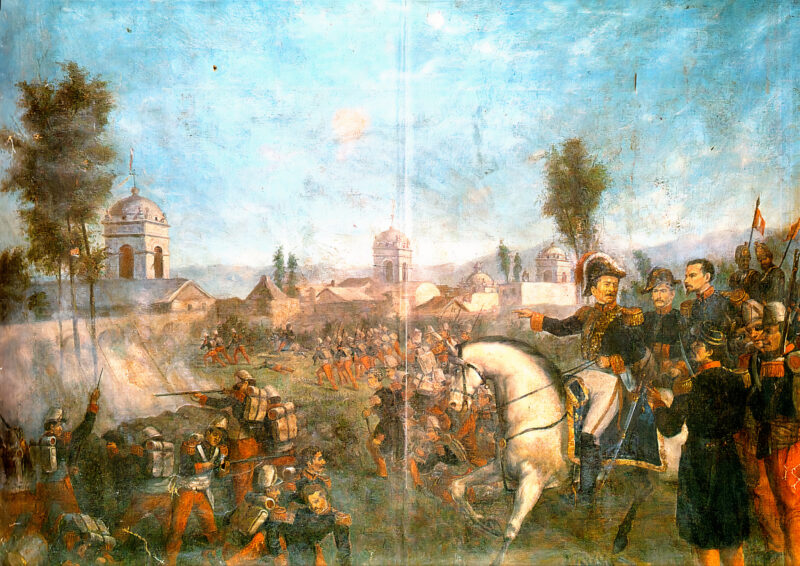
The Many South Carolinas in the Americas
In recent years, the transnational turn in Civil War scholarship has finally started to include Latin America. While Mexico with the French-Mexican Conservative Alliance has long attracted a significant amount of scholarship, the rest of Latin America has not. Recent works by Evan Rothera and James Sanders offer glimpses into ...
Read More
Read More
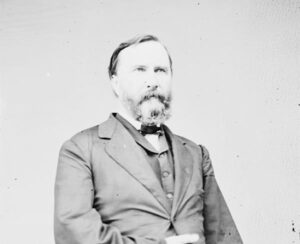
Interview with Elizabeth Varon
Today we share an interview with Elizabeth Varon, who published an article in the March 2023 JCWE, titled “The "Bull-Dog" in Istanbul: James Longstreet's Revealing Tour as US Minister to Turkey, 1880–81.” Varon is the Langbourne M. Williams Professor of American History at the University of Virginia. As a historian ...
Read More
Read More
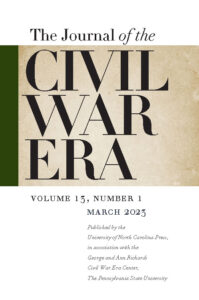
Editors’ Note for March 2023 JCWE
Welcome to the first issue of the 2023 volume of the Journal of the Civil War Era. The issue features three research essays and a review essay that highlight the journal's broad geographical, chronological, and topical coverage. We present articles that take us from the antebellum North to California to ...
Read More
Read More
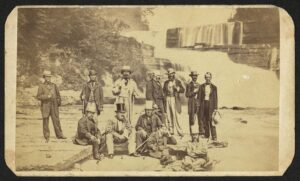
Civil War Historians and Terminology: Diplomatic History
As historians of the Civil War era, we are all extremely familiar with the growing desire of using appropriate terminology in our scholarship and the pushback that such terminological changes have brought. We saw this when the Army University Press abandoned the term “Union” in its publications.[1] Slavery scholars had ...
Read More
Read More
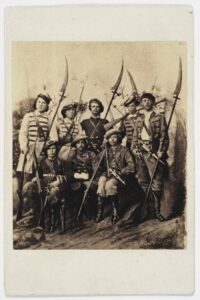
Crossing Borders as Refugees: A Comparison of Dakota and Poles
Civil War era historians have made several comparisons between Russia’s suppression of the Polish rebellion in 1863 and the U.S. efforts to quash the enslavers’ rebellion in the United States. Most of these comparisons are either imbued by traces of U.S. exceptionalism, such as the many U.S. centric interpretations of ...
Read More
Read More
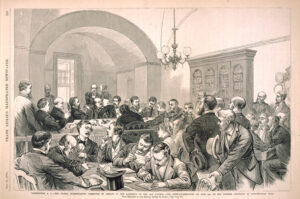
Challenging Exceptionalism: The 1876 Presidential Election, Potter Committee, and European Perceptions
In May 1878, the House of Representatives appointed Representative Clarkson N. Potter (NY-12) to investigate claims of fraud during the 1876 election. The commission, as Adam Fairclough untangles in his new book, uncovered massive wrongdoing on both sides, including so-called bulldozing by Louisiana Democrats, Republican election theft, and attempts to ...
Read More
Read More

Previewing the December 2021 JCWE Issue
As we write this editors' note in summer 2021, we are hopeful that many in-person activities will soon resume, including the conferences, seminars, workshops, and writing groups that are so important to our collective work. Our issue features three research essays about men's lives that touch on politics, ideology, and ...
Read More
Read More
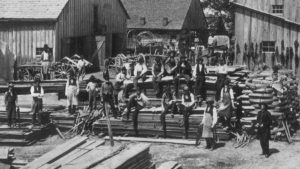
“I remember that Jasper Gray told me that he had herded sheep in Australia”
In 1906, Oscar Nelson, a local African American living in Tennessee, provided testimony on the extraordinary life of Jasper Gray, a United States Colored Troops (USCT) veteran, of the Thirty-First United Colored Infantry (USCI). Gray was a man whose entire life—in bondage and freedom—was one of constant physical movements and ...
Read More
Read More
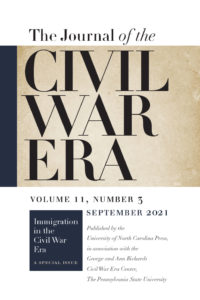
Previewing September 2021 Issue: Immigration in the Civil War Era
While recent immigration scholars have turned most of their attention to the twentieth century, many historians are also reexamining immigration policy in the mid-nineteenth century. Alison Clark Efford, in a recent review essay in this journal, reflects on how nineteenth-century immigration historiography is marked by an “imperial framework in which the ...
Read More
Read More
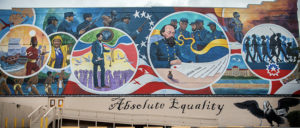
Juneteenth, Public Memory, and Teaching Reconstruction Through an International Perspective
A few weeks ago, the United States celebrated Juneteenth as a federal holiday for the first time. The bill recognizing the emancipation celebration passed the Senate and House and was signed into law by President Joe Biden in a matter of days, just in time for Americans to celebrate this ...
Read More
Read More
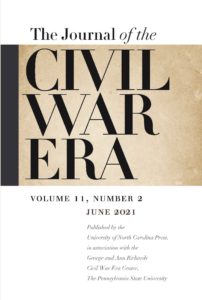
JCWE Editors’ Note, June 2021 issue
This issue, like many since the journal’s inception, reflects the chronological and thematic breadth of the field of the Civil War Era. It includes three original research articles, the Tom Watson Brown Award essay, a review essay, and the usual complement of incisive book reviews. The Tom Watson Book Award ...
Read More
Read More
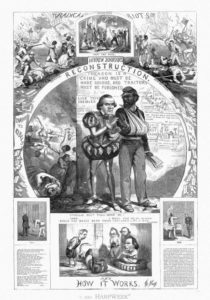
The Necessity of National Unity: Defeated Confederates’ International Appeals to Unity
Citizens were divided. Violence threatened the stability of the nation. After the violence ended, calls rose for unity. This pattern played out recently with calls to move past and forgive insurrectionists in the name of national unity following the January 6, 2021 attack on the US Capitol. Such a pattern ...
Read More
Read More

Introducing Ann Tucker to the Muster Team
Muster is proud to introduce Ann Tucker as a regular contributor. Ann L. Tucker is an assistant professor of history at the University of North Georgia. She earned her BA at Wake Forest University and MA and PhD the University of South Carolina. Dr. Tucker’s areas of expertise include the US ...
Read More
Read More
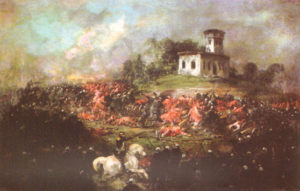
The War of the Rebellion a European-style War?: Latin American Comparisons
The War of the Rebellion in North America has brought forth a massive number of studies in military history. Very few of them are comparative in nature.[1] In addition, there does not seem to be a corresponding scholarly interested in the many civil wars and revolutions in Latin America during ...
Read More
Read More
